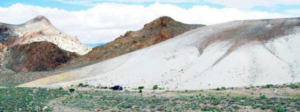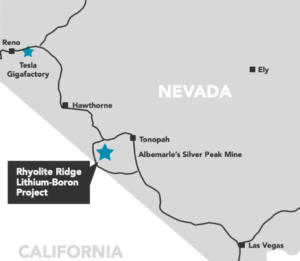Boron supply security in the spotlight
Mining
Special Report: Rising global tensions have brought the need to secure critical minerals such as boron sharply into focus.
This is clearly highlighted by Turkey’s decision to contract a Chinese company to build a boron carbide plant, with completion expected within 24 months.
Boron carbide is used for many purposes, but one of its key uses is for lightweight yet super-strong armour plating for military vehicles.
And if this wasn’t enough of a concern, Turkey holds about 73 per cent of the world’s boron reserves and anywhere between 55 per cent and 60 per cent of total borate production, which includes any product that contains boron – from the naturally occurring mineral colemanite, through to refined products like boric acid.
Read more: Everything you ever wanted to know about Boron
The only other major boron producer globally is Rio Tinto’s (ASX:RIO) rather imaginatively named Boron Mine in California, which has been in production for 100 years and is believed to be in the latter part of its life.
ioneer (ASX:INR) managing director Bernard Rowe told Stockhead that with Turkey and China collaborating on the boron carbide plant, China – the world’s largest producer of boron carbide – is effectively maintaining its control over the boron carbide market.
“There is an opportunity for China and Turkey to do something along similar lines to what happened in rare earths where they maintain dominance over not so much the in-ground raw material , but dominance over the actual processing and refining to make the end product,” he said.
“The fact that you have so much of the world’s reserves of boron concentrated in Turkey makes it much easier to maintain control of the market, particularly if you already have a relationship with Turkey.
“Turkey is not exactly at the top of the list of friendly countries that the US is trading with at the moment. They recently suspended trade negotiations and there is talk of trade sanctions if the situation in Syria were to further deteriorate.”
Rowe added that with increasing demand for boron products, particularly boron carbide and ferro-boron, which is used in permanent magnets along with rare earths, the increasing US reliance on Turkey for boron has certainly not gone unnoticed in Washington.
According to a report from QY Research done last year, the global market for refined boron was worth about $US2.04 billion ($3.01 billion) in 2017 and is expected to reach US$2.9 billion in 2025.
 Outcropping high-grade lithium-boron mineralisation at Rhyolite Ridge
Outcropping high-grade lithium-boron mineralisation at Rhyolite Ridge
This is also the reason why Rowe believes that while the lithium and boron resources contained within ioneer’s Rhyolite Ridge project in Nevada are equally important in terms of revenue, the boron is the more strategic of the two minerals.
“It (Rhyolite Ridge) is strategic as a lithium deposit because it is one of the few advanced lithium deposits in the US with demonstrated favourable economics,” he said.
“There is obviously very strong support for domestic lithium production, particularly in Nevada – the home of the Tesla Gigafactory. It is seen as a critical element for electric propulsion and storage of renewable energy, and combatting climate change by electrifying transportation is a priority for many politicians on both sides of politics.
“Boron, on the other hand, is a bit different because 73% of global reserves are concentrated in one country, Turkey, while the US has only about 6% of reserves.
“Without the development of another large boron deposit like Rhyolite Ridge, the world will eventually be solely reliant on Turkey for supply of this critical material.
“So, while the lithium and boron are equally important in terms of revenue , strategically Rhyolite Ridge is more important as a boron deposit because there are so few large boron deposits globally that can produce 200,000 to 300,000 tonnes per year.”

Rhyolite Ridge is a large, shallow lithium-boron deposit that is envisaged to produce 20,000 tonnes of lithium carbonate and 173,000 tonnes of boric acid per annum at full capacity.
The project is close to existing infrastructure and currently has a resource containing 12.4 million tonnes of boric acid and 1.3 million tonnes of lithium carbonate.
A pilot plant has already demonstrated the project’s ability to produce high-quality lithium and boron products, with samples sent to 30 potential offtake partners.
ioneer expects to release a definitive feasibility study for the project in the first quarter of 2020 once it incorporates enhancements to the engineering design of the processing plant and is aiming to start production in late 2021.
Read more:
Mounting demand for neodymium-iron-boron magnets puts the spotlight on ioneer
Supporting growth of ‘strategic metal’ supply chains in the US gains fresh momentum
>> Now watch: 90 Seconds With… Bernard Rowe, ioneer Ltd